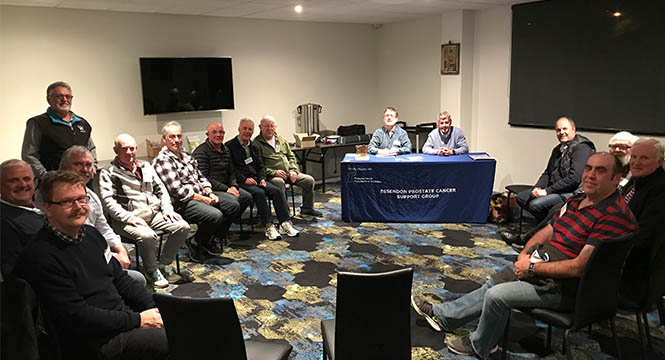It was the death of his best mate to bowel cancer that made Rob get serious about his health.
“It was my first encounter with cancer and watching him go through palliative care put a shock into me,” he explained.
“At that stage I was 49, and I decided I better start getting annual doctor’s checks. Usually, I’d only go if I broke my leg. Two years later I was diagnosed with prostate cancer.”
Through his private health insurance, Rob met with a urologist, who immediately recommended treatment to remove his prostate. Having never had a major surgery before, Rob decided to search for alternatives.
“I asked my doctor if I was going to die in a year, and he said no, so I thought I had some time to research. I ended up finding the Diamond Valley Prostate Cancer Group,” continued Rob.
“It was reasonably daunting at first. You’re going in there expecting to talk about your health, and men don’t tend to want to talk about that. But it didn’t take long for people to start to have a chat. It was nice to actually talk to people that have been through it.”
Rob is in the minority when it comes to men reaching out for support. The 2020 Australian Longitudinal Study of Male Health report found only a quarter of men would seek help if they were experiencing personal or emotional problems. Across all ages, men face more barriers to getting help than women, from practical reasons including cost and wait times to the stigma that it will be seen as weak and unmanly.
 Rob (LHS at table), with the Essendon Prostate Cancer Support Group, which he now convenes.
Rob (LHS at table), with the Essendon Prostate Cancer Support Group, which he now convenes.
It’s a common story for Peter, who leads the Eltham Prostate Cancer Information and Support Group. His involvement with the group spans the past decade, first joining on through his work in men’s health.
Support groups are increasingly being recognised as an important aspect of professional health care, including for people affected by cancer. Peer support is critical in reducing stress and isolation, improving health literacy and knowledge, increasing access to services, and building a sense of community for those most vulnerable.
“Most men don’t have a view to even go looking for support and very likely don’t know such groups exist,” Peter said. “Many just want to deal with their cancer diagnosis quickly and pragmatically.
“One of the frustrations we get when men do attend support groups is that it’s generally after they’ve made up their mind about their treatment. They've either had the treatment or they're about to have it, and it's too late to consider anything else.
“Men should be encouraged to come to these groups at the very beginning of the journey when they first get diagnosed, so they can learn that there are a range of options for them.”
Such advice hit home when Peter was diagnosed with prostate cancer himself. He believes being part of a support group, which connected him with others who have been in similar situations, was a hugely useful resource.
“I reached out and spoke to men in other groups who had been through treatment and learnt from their experiences, which was really beneficial,” Peter said.
Cancer support groups do not provide medical advice, but rather a safe, supportive and most importantly, confidential, space to discuss the impacts of diagnosis and treatment, and to access evidence-based information. This can include coping with side effects, the impact on sexuality and relationships, and how it feels when cancer comes back, among other topics.
Each support group differs, but Peter welcomes anywhere from six to eighteen people each month, with more gathering to hear from guest speakers who are occasionally invited throughout the year. Over 200 people have attended his group since its inception over 17 years ago, with social events additionally staged to keep members connected.
And it’s not just people diagnosed with cancer who are invited – loved ones are just as integral to support groups. Often, it’s the partners and children who do the initial research, and many find relief and comfort in sharing their experiences and the impact on their own relationship and wellbeing.
“Minutes after you’re told you have cancer you don’t hear a thing,” continued Rob. “I was in the room, but my mind wasn’t there. Having my partner with me was critical.
“It’s not only men in the groups. I’ve had women coming on their own for information, and then their husbands join in the next meeting. The role of the carer is something we often talk about, and it can be good for partners to come and convey their side of the story for us to listen to. They’re just as important as the members.”
The confidence and friendships that came from joining a support group led Rob to start his own in Essendon, servicing a previously unreached community. But he is quick to acknowledge that not everyone is going to have the same experience.
“People come and go,” he said. “Most guys will come along, get the help they want and then not come back, and that's fine. That's what our job is to do. Whereas others will come along, get help and stay.
“We’re not trying to increase membership, there’s no sign-up fee. The option is all theirs.
“For me, there’s this feeling that you’re not alone. You get the bad as well as the good, but it's the mateship that you build with people that keeps you going back,” he concluded.